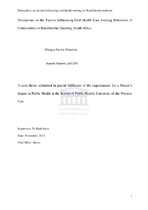| dc.contributor.advisor | Stern, Ruth | |
| dc.contributor.author | Makubalo, Mlungisi Patrick | |
| dc.contributor.other | School of Public Health | |
| dc.date.accessioned | 2014-03-10T10:19:21Z | |
| dc.date.available | 2013/05/10 | |
| dc.date.available | 2013/05/10 11:34 | |
| dc.date.available | 2014-03-10T10:19:21Z | |
| dc.date.issued | 2012 | |
| dc.identifier.uri | http://hdl.handle.net/11394/2950 | |
| dc.description | Magister Public Health - MPH | en_US |
| dc.description.abstract | The negative effect of poor oral health on quality of life and financial implication of work days lost as a result of dental pain can be accepted as a rationale for inclusion of oral health in the primary health care (PHC) package for South Africa. The norms of the PHC package for oral health services are to expose at least 50% of primary schools to organized school preventive programmes and to ensure basic coverage of everybody in the catchment areas. Currently these norms are not adequately fulfilled in Randfontein. The purpose of this study was to gather information that can be used to improve oral health services in Randfontein. The aim of the study was to gain an understanding of the factors that influence the choice of oral health care seeking behaviour as perceived by residents in different contexts and to use these perceptions to inform appropriate health planning strategies and implementation of measures that can improve health promotion in Randfontein. This qualitative study explored oral health care seeking behaviour. The study population comprised all residents of Randfontein above seventeen years old who had visited the oral health section in the Randfontein Primary Health Care (PHC) Facility. There were two focus group discussions (FGDs) from each of three separate residential areas namely Mohlakeng with mainly black residents, Toekomsrus with mainly coloured race residents and from town which is a predominantly Caucasian race area. Data collected was analysed during the data collection stage and thereafter until they made sense to the researcher. To strengthen validity, the accuracy of the interpretation of what respondents said was confirmed with them. Analysed themes were coded and categorized to enable the key researcher to interpret them for final reporting. Appropriate ethical procedures were followed. The findings were that although all focus groups preferred allopathic oral health care seeking, various barriers existed. The study concluded that there should be adequate oral health education and promotion, effectivecommunication and an expansion of these services to Toekomsrus, where they do not exist. Perceptions on factors influencing oral health seeking by Randfontein residents. | en_US |
| dc.language.iso | en | en_US |
| dc.publisher | University of the Western Cape | en_US |
| dc.subject | Gauteng | en_US |
| dc.subject | South Africa | en_US |
| dc.subject | Oral health care seeking behaviour | en_US |
| dc.subject | Perceptions | en_US |
| dc.subject | Socio-economic constraints | en_US |
| dc.subject | Cultural factors influencing oral health care seeking behaviour | en_US |
| dc.subject | Common oral diseases | en_US |
| dc.subject | Oral health promotion and disease prevention | en_US |
| dc.subject | Apartheid policies | en_US |
| dc.title | Perceptions on the factors influencing oral health seeking behaviour of communities in Randfontein, Gauteng, South Africa | en_US |
| dc.rights.holder | Copyright: University of the Western Cape | en_US |
| dc.description.country | South Africa | |

